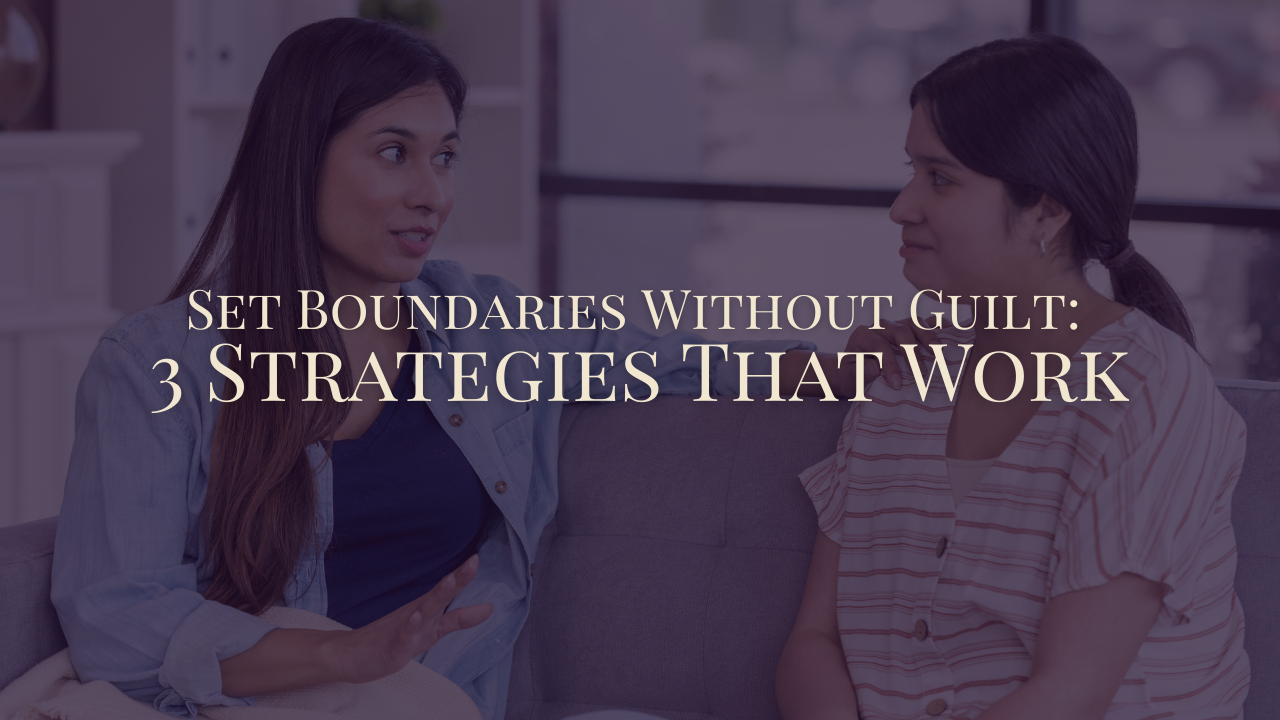Set Boundaries Without Guilt: 3 Strategies That Work

We've all been there. That moment when you finally gather the courage to say "no" to something you don't want to do—only to be immediately flooded with guilt. Maybe it's turning down extra work when you're already overwhelmed, declining an invitation from a friend when you desperately need alone time, or asking a family member to stop commenting on a sensitive topic.
Setting boundaries is one of the most important self-care practices we can develop, yet it's often accompanied by uncomfortable feelings of guilt, selfishness, or worry about hurting others. This internal conflict can make it incredibly difficult to establish and maintain the healthy limits we need.
But what if setting boundaries didn't have to feel this way? What if you could protect your time, energy, and emotional well-being without the aftermath of guilt?
Why We Feel Guilty About Setting Boundaries
Before diving into strategies, it helps to understand why boundary-setting triggers guilt in the first place:
- Many of us were raised to prioritize others' needs before our own
- We may have been conditioned to view self-care as selfish
- We worry about damaging relationships or disappointing people we care about
- Past experiences of negative reactions when setting boundaries can create anxiety
- We may struggle with feeling worthy of having needs and limits
The good news is that with practice and the right approach, setting boundaries can become not just easier, but actually empowering. Let's explore three effective strategies that can help you establish healthy limits without the accompanying guilt.
1. Start Small and Build Gradually
One of the biggest mistakes people make when beginning to set boundaries is trying to make dramatic changes all at once. This approach often amplifies feelings of guilt and can create unnecessary resistance both from yourself and others.
Try this instead:
Begin with smaller, less emotionally charged boundaries. Perhaps start by setting limits around your work hours before tackling more personal boundaries with close family members. Or practice with people you feel safer with before addressing boundaries with those who tend to challenge them.
For example:
- Start by not checking work emails after 7 PM one night a week
- Practice saying "I need to think about it" instead of immediately agreeing to requests
- Set a small boundary around a topic of conversation that isn't deeply triggering
Each successful boundary you set builds confidence for the next one. Think of it like building a muscle—you wouldn't start with the heaviest weights in the gym on day one. Give yourself permission to progress gradually.
"The key is making your boundaries about self-respect rather than rejection of others. Small, consistent boundaries communicate your needs while giving everyone (including yourself) time to adjust."
2. Use "I" Statements Instead of Accusations
The way we communicate boundaries makes a tremendous difference in how they're received—and how guilty we feel about setting them. When boundaries sound like accusations or criticism, they naturally trigger defensiveness in others and amplify our own feelings of guilt.
Try this instead:
Frame your boundaries using "I" statements that focus on your needs rather than the other person's behaviour. This approach allows you to express your limits clearly while minimizing blame.
Instead of: "You always dump your problems on me and it's exhausting."
Try: "I care about you, but I'm feeling emotionally drained right now. I need some time to recharge before I can be a supportive listener again."
Other examples:
- "I feel overwhelmed when I have too many commitments, so I need to decline this invitation."
- "I value our work relationship, which is why I need to finish my current projects before taking on new ones."
- "I'm working on being more present with my family, so I won't be checking messages during evenings together."
This method acknowledges your personal needs without suggesting that the other person is doing something wrong. As a result, both of you are more likely to feel respected during the conversation.
3. Practice Self-Compassion Throughout the Process
Perhaps the most powerful antidote to boundary-related guilt is developing self-compassion—treating yourself with the same kindness and understanding you would offer a good friend.
Try this instead:
When you notice guilty feelings arising around a boundary you've set, pause and check in with yourself compassionately:
- Recognize that setting boundaries is challenging for most people
- Acknowledge that your needs are valid and important
- Remember that healthy boundaries actually improve relationships in the long run
- Understand that temporary discomfort often precedes positive change
You might even develop a personal mantra to repeat when guilt surfaces, such as: "By taking care of myself, I'm becoming more authentic in all my relationships" or "Setting this boundary is an act of self-respect, not selfishness."
"Setting boundaries isn't about building walls—it's about creating gates that you can open and close as needed. This protects your energy while still allowing for genuine connection."
The Unexpected Benefits of Boundary Setting
As you practice these strategies, you'll likely discover that setting boundaries delivers benefits far beyond what you initially imagined:
- Increased energy and reduced resentment: When you're not constantly depleting yourself to meet others' expectations, you have more to give when you truly want to.
- More authentic relationships: People get to know the real you, not the version of yourself that's constantly accommodating at your own expense.
- Greater self-trust: Each time you honor your own limits, you build confidence in your ability to care for yourself.
- Modelling healthy behaviour for others: Your boundary-setting demonstrates to friends, family, and especially children that self-respect is important.
Remember: It's a Practice, Not Perfection
Like any meaningful skill, setting boundaries without guilt takes practice. There will be uncomfortable moments, conversations that don't go as planned, and times when old guilt patterns resurface. That's completely normal.
The goal isn't perfect boundary-setting—it's progress. Each time you honor your needs, communicate them clearly, and respond to yourself with compassion, you're developing a crucial life skill that will serve you in every relationship.
Start small, use "I" statements, practice self-compassion, and watch as setting boundaries transforms from a guilt-inducing challenge into an empowering act of self-care.
What boundaries have been most challenging for you to set? Share your experiences in the comments below, and let's learn from each other's journeys.
🔥 Ready to Stop Feeling Guilty About Your Boundaries—and Start Owning Them?
Join The Trinity Transformation™ and let's turn your boundary-setting into your greatest source of clarity, power, and peace.
Because true self-care isn't about doing more. It's about coming home to yourself.
CTA: DM me @mindfulnesswithmahara or email @ [email protected] for more info.



